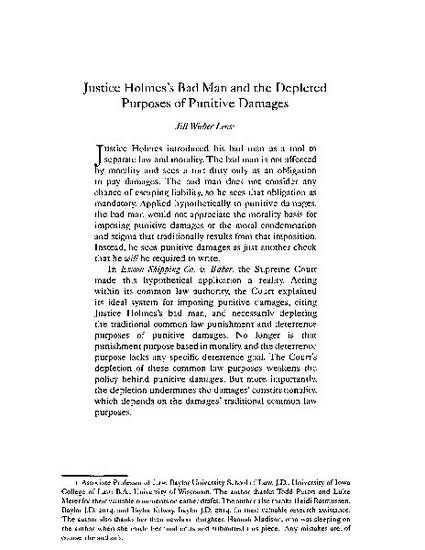
Article
Justice Holmes’s Bad Man and the Depleted Purposes of Punitive Damages
Kentucky Law Journal
(2013)
Abstract
Justice Holmes introduced his bad man as a tool to separate law and morality. The bad man is not affected by morality, and sees a tort duty only as an obligation to pay damages. The bad man does not consider any chance of escaping liability, so he sees that obligation as mandatory. Applied hypothetically to punitive damages, the bad man would not appreciate the morality basis for imposing punitive damages or the moral condemnation and stigma that traditionally results from that imposition. Instead, he sees punitive damages as just another check that he will be required to write.
In Exxon Shipping Co. v. Baker, the Supreme Court made this hypothetical application a reality. Acting within its common law authority, the Court explained its ideal system for imposing punitive damages, cited Justice Holmes’s bad man, and necessarily depleted the traditional common law punishment and deterrence purposes of punitive damages. No longer is that punishment purpose based in morality, and the deterrence purpose lacks any specific deterrence goal. The Court’s depletion of the damages’ common law purposes of punitive damages undermines the damages from a policy basis. But more importantly, the depletion undermines the damages’ constitutionality as that constitutionality depends on the damages’ traditional common law purposes.
Keywords
- punitive damages,
- punishment,
- deterrence,
- Exxon Shipping Co. v. Baker
Disciplines
Publication Date
2013
Citation Information
Jill W Lens. "Justice Holmes’s Bad Man and the Depleted Purposes of Punitive Damages" Kentucky Law Journal Vol. 101 (2013) p. 790 Available at: http://works.bepress.com/jill-lens/10/
